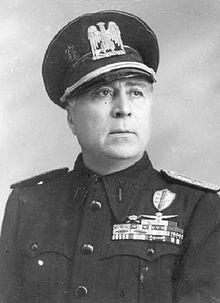Roberto Farinacci
|
The Honourable Roberto Farinacci |
|
|---|---|
 |
|
| Member of the Grand Council of Fascism | |
|
In office 1 January 1935 – 2 August 1943 |
|
| Prime Minister | Benito Mussolini |
| Secretary of the National Fascist Party | |
|
In office 15 February 1925 – 30 March 1926 |
|
| Preceded by | Quadrumvirate |
| Succeeded by | Augusto Turati |
| Member of the Italian Chamber of Deputies | |
|
In office 11 June 1921 – 5 August 1943 |
|
| Constituency | At-large |
| Personal details | |
| Born |
16 October 1892 Isernia, Italy |
| Died | 28 April 1945 (aged 52) Vimercate, Italy |
| Cause of death | Executed by firing squad |
| Political party |
Reformist Socialist Party (1914–1919) Italian Fasci of Combat (1919–1921) National Fascist Party (1921–1943) Republican Fascist Party (1943–1945) |
| Spouse(s) | Anita Bertolazzi (m. 1910; his death 1945) |
| Profession | Journalist, soldier |
| Religion | None (Atheism) |
| Military service | |
| Allegiance |
|
| Service/branch |
|
| Years of service | 1916–1917; 1936 |
| Rank | |
| Unit | 3rd Telegraphist Regiment Blackshirts |
| Battles/wars | |
Roberto Farinacci (Italian pronunciation: [roˈbɛrto fariˈnattʃi]; 16 October 1892 – 28 April 1945) was a leading Italian Fascist politician, and important member of the National Fascist Party (PNF) before and during World War II, and one of its ardent anti-Semitic proponents; Christopher Hibbert describes him as "slavishly pro-German".
Born in Isernia, Molise, he was raised in poverty and dropped out of school at a young age, moving to Cremona and beginning working on a railroad there in 1909. Around this time period, he became an irredentist socialist and, when World War I began, a major advocate of Italy’s participation in the war. After the war, Farinacci was an ardent supporter of Benito Mussolini and his Fascist movement. He subsequently established himself as the (local leader, a title borrowed from the Ethiopian aristocracy) of the Fascists in Cremona, publishing the newspaper Cremona Nuova - later on Il Regime Fascista - and organizing Blackshirts combat squads in 1919. The Cremona squads were amongst the most brutal in Italy, and Farinacci effectively used them to terrorize the population into submission to Fascist rule. In 1922, Farinacci appointed himself mayor of Cremona.
Quickly rising as one of the most powerful members of the National Fascist Party, gathering around him a large number of supporters, Farinacci came to represent the most radical syndicalist faction of the party, one that thought Mussolini to be a too liberal leader (likewise, Mussolini believed Farinacci was too violent and irresponsible). Among fascists, Farinacci was known to be particularly anti-clerical, xenophobic, and anti-semitic. Nevertheless, Farinacci’s career continued to rise, and he played a considerable role in establishing Fascist dominance over Italy in 1922, during and after the March on Rome.
...
Wikipedia
